On May 2, 1953, fragments of love letters written by Joyce to Richard during the previous summer when Joyce and her husband Robert were in Alaska, were read aloud in court. Richard told the truth about the existence of the letters.
Did Robert know anything about her affection for his friend? On the witness stand, Robert admitted he knew Joyce had deep feelings for Richard and he had “turned-the-other-cheek.” Joyce said she wrote the letters (26 of them, each at least 20 pages) to cheer Richard up and, “to keep him from committing suicide.” Joyce denied Richard’s claim that he was the father of her unborn child. Joyce responded to his claim, “Hearing that read in court from his confession didn’t surprise me–or Robert, either. We’d read it before. Richard is like that, always imaging things. He’s making all that up.” But was he? He didn’t lie about the letters.
Whether the jurors would hear the contents of the letters was up to Superior Judge Mildred L. Lillie. One important question about the letters was whether they were Joyce wrote them. Had Richard forged or tampered with them? Joyce was sworn in and handed a bundle of letters. She gave them a cursory look and then said that she didn’t think all of them were in her own handwriting. “I’d have to read them all,” she said. “There’s been all kinds of stuff added,” although she finally conceded that “basically” she was the author. Judge Lillie instructed Joyce to go through the letters and delete whatever was not in her handwriting. Then Judge Lillie allowed the letters to be entered into evidence. Maybe the letters would reveal the truth about Joyce and Richard’s relationship.
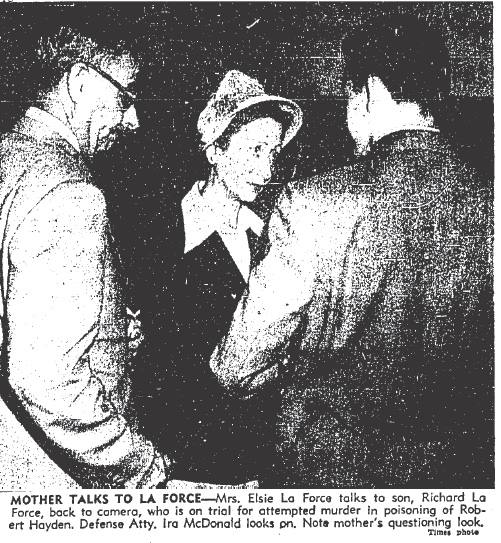
On June 3, 1952, Joyce wrote to Richard telling him she received two letters which were delayed by a storm. She said she went off by herself to read them. “Anyway, I got to sit down–all by myself–in the ‘Garden’ (we know nothing will grow before we leave) and read them–which made me very happy.” She continued. “The only time I can really be alone is when it’s nice, so I can go outside and at nite after everyone leaves and Robert is asleep. And then I am not only alone but lonely. Richard, don’t worry about if I’ll be interested at least a little bit–I am interested very much in everything you write and do, so make it a problem to write me, just write exactly like you have been and tell me anything or everything you think, do or feel and I’ll be very happy. OK?”
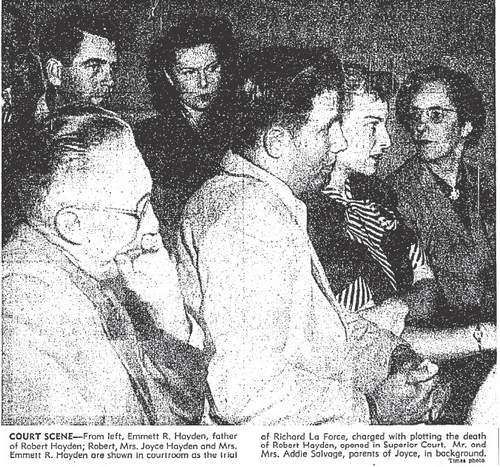
Joyce asked Richard to take the time to sit down and write her a long letter. She wanted to know how he would have planned his life if he had done anything he wanted “from grammar school on.”
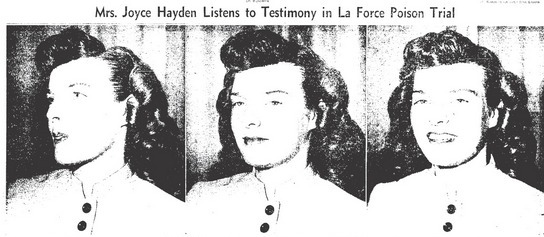
On June 6, Joyce wrote, “What I said about all the hours we spent–I didn’t mean wasted. I just was thinking how nice a few of those hours would seem now and it seems like there is so much to be said that could have, but really, I guess it’s like you say, there are better ways of saying things than words. That’s what is lacking because we can use all the ‘words’ we want now — and nothing else! But I do remember, too, surely you expected me to. And it makes me very happy, but I can’t keep from thinking–then what!”
In one of her letters Joyce talked about marriage: “You ask if I would have accepted to marry you–yes, I would and it seems, Richard, that our dreams are very similar.” Joyce signed most of her letters “All My Love.”
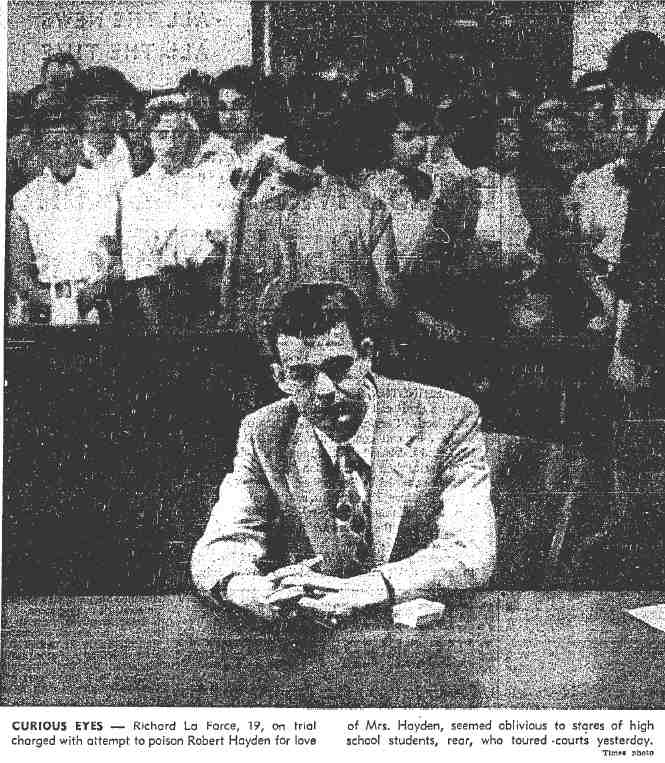
Was Joyce in love with Richard? She described her loneliness to him in many of her letters. She may have sought the attention she felt Robert didn’t give her. No matter how sophisticated the situation seemed, it is important to remember that each of the principal players was only 19-years-old. The extreme emotional highs and lows of teenagers are well documented.
Joyce’s denial of loving Richard stung. A Los Angeles Times reporter observed the defendant lower his head when he heard the love of his life testify that once she and Robert arrived home from Alaska, her feelings for Richard changed. “He hung around too much, and he was very moody. I was a little tired of him,” she said.
During the middle of the trial, a note from Joyce to Richard written prior to the 1952 Alaska trip surfaced, and it shed some light on the relationship. Joyce and Robert were married for only a year when Richard confessed his love for Joyce in a letter. Joyce confessed she loved both Robert and Richard, but she felt she was better suited to Robert. She said, “Richard, you and I–I feel are really genuine friends and I feel will always be, even now, but it’s horrible to ruin a beautiful friendship.” She encouraged him to find someone who would make him happy.
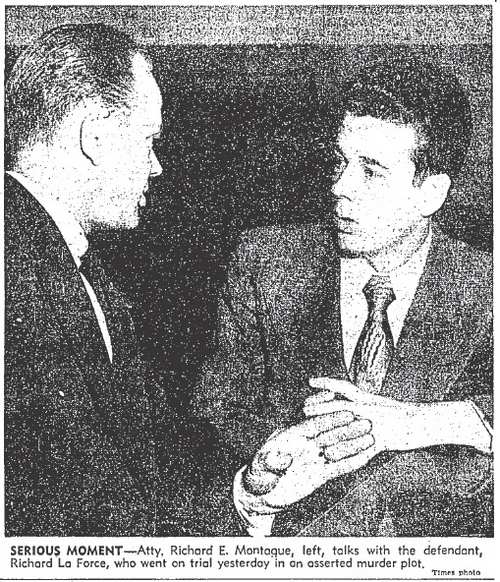
What would the jury of eight women and four men make of the case? Was Richard’s testimony that he and Joyce were intimate credible? And what about the suggestion that Joyce, and not Richard, tried to poison Robert?
The jury failed to reach a verdict after the first four hours of deliberation. They returned to the jury room and at last decided Richard’s fate.
They acquitted Richard of attempted murder, but found him guilty of mingling poison with beverages with intent to harm Robert.
When she heard the news, Joyce said, “We are going to try to forget we ever knew Richard.”
EPILOGUE: I always try to find out what happened to the people involved in a criminal case–and this one is no exception. Joyce and Robert’s teenage marriage survived for nearly twenty years before they divorced in 1970. Joyce may have remarried, but I don’t know if Robert did.
Richard LaForce earned a Ph.D. He moved to Modesto in 1986, and died there in 1992 at 58. His obituary names his children, and a brother. No spouse is mentioned, so he was probably divorced or widowed.
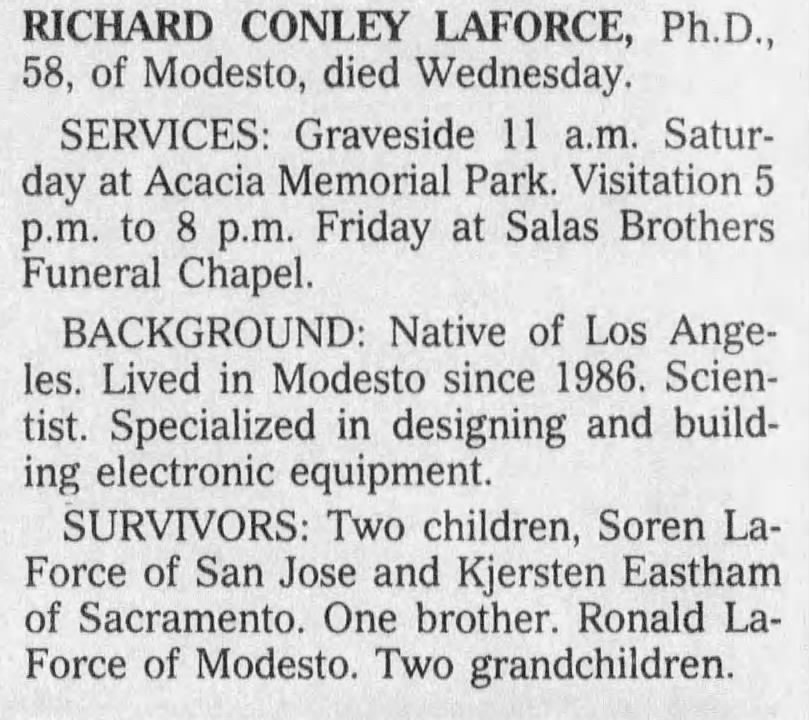

I\’ve read the majority of stories on your site and just wanted to say thanks and that this one is especially interesting.
Thank you, John. I appreciate your support.
Joan